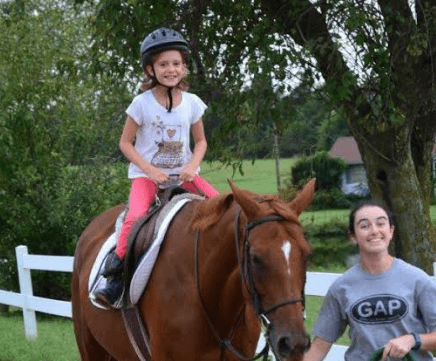Volunteers support children with disabilities through horses
3 min read
Kristie McCary
By JAMIE MCGUIRE
Staff Writer
Many University of Mary Washington students choose to enjoy their downtime volunteering at Hazelwild Farm with the therapeutic riding program. Hazelwild Farm, host of the UMW equestrian team, offers therapeutic horseback riding for people of all ages with physical and mental disabilities. These volunteers donate their time and energy every Tuesday night in order to help these children ride. Many of them have voiced how much they love the program and how worthwhile it is.
“I had never worked with children with disabilities before volunteering with this program.” said Elizabeth Finto a junior and communications major. She said that at first she was anxious about being unable to meet their needs or be able to help when something happened, now two years later she has a strong relationship with the kids who ride in the program.
Riding instructor, Kristie McCary started as a volunteer back in 2002 and since then has been certified as an instructor and took over as the director of the program in 2005. McCary said that the benefits from therapeutic riding are different for each rider.
“Some gain the physical benefits, such as core strength, flexibility, muscle memory,” she said. “The natural gait of a horse while riding closely mimics a human walking gait… Some have a social benefit, and some gain an emotional benefit… There’s something very empowering and special about being in control of an animal so much bigger than you.”
 While the benefits of riding for children and adults with disabilities are helpful, the volunteers have also mentioned a powerful impact on themselves from being around the horses.
While the benefits of riding for children and adults with disabilities are helpful, the volunteers have also mentioned a powerful impact on themselves from being around the horses.
Finto said that when she goes to Hazelwild Farm,“the therapeutic effects from the horses and activities not only benefit the children, but also help me to relax and de-stress after a long day… It is an hour that I can just stop thinking about homework and studying… I also find it rewarding when we are able to make at least one child smile and laugh.”
Another volunteer, Samantha Bennett, said it makes her happy to see someone with disabilities come out of their shell and express themselves. After three years of volunteering for the therapeutic riding program at Hazelwild Farm, she would love to continue volunteering in the future.
It was also surprising to see that the children are not the only ones coming out of their shells. Junior and English major, Katherine Brown said that the horses all have different personalities. However, some become more gentle and attentive in lessons with their riders. For example, according to Bennett, the horse Barnie a Haflinger in his late teens, is usually testy with normal riders but when escorted out to his special job, he is “an angel.”
Brown explained that “each person riding has a different skill set, which has to be matched to the horse.” The riders have different skill sets and need to be paired with a horse that can sense the rider’s demeanor and will respond to it.
One horse in particular, named Penny for the brown star-shaped mark on her forehead, is a favorite among riders. According to Finto, her gentle and steady spirit is perfect for those who struggle with balance and she often responds to the riders’ emotions and demeanor.
Finto, Brown and Bennett all said that what the program still needs is more volunteers. Finto urged students to volunteer their time and come out to spend time with horses and children. “A lot of times, volunteers come out at the very beginning and never come back again” said Finto.
The Hazelwild therapeutic riding program relies completely on the use of volunteers in order to operate. They utilize students from the University of Mary Washington, area high school students, as well as members of the local community.
For more information about volunteering, contact Kristie McCary or visit www.hazelwildfarm.com/.


